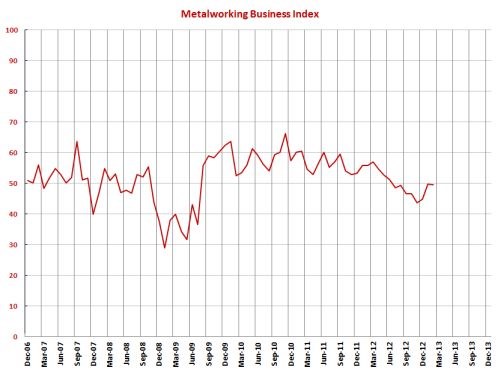February MBI at 49.6 – Industry Essentially Flat
With a reading of 49.6, Gardner’s metalworking index showed that business activity in the metalworking industry was virtually flat in February 2013 compared to January 2013.
Share




.jpg;maxWidth=600)

With a reading of 49.6, Gardner’s metalworking index showed that business activity in the metalworking industry was virtually flat in February 2013 compared to January 2013. The contraction that started in July 2012 has ended relatively quickly in the last two months.
New orders and production have grown the last two months, which is a positive sign for future growth in metalworking. The rate of growth in new orders slowed slightly while the rate of growth in production accelerated. Despite the faster growth in new orders relative to production, backlogs continue to contract. The rate of contraction in backlogs has slowed noticeably, but the backlogs subindex is a significant reason why the metalworking index remains just below 50. Also weighing down the metalworking index are exports. The dollar was appreciating for much of 2012 and exports have contracted the last 15 months as a result. This trend could reverse in 2013 with increased quantitative easing from the Federal Reserve. After two months of very mild contraction around the election, the employment subindex has grown moderately the last three months.
While increased quantitative easing could help exports, it is hurting manufacturers by causing higher materials prices. Material prices are increasing at their fastest rate since March 2012. Prices received have increased the last two months, but at a much slower rate than material prices. The combination of growing employment and rapidly increasing material prices is putting pressure on profits of metalworking facilities.
While the overall index remains in a mild contraction, performance has been split based on shop size. Facilities with more than employees have grown for at least the last two months. However, shops with fewer than 50 employees continue to contract. While the rate of contraction in smaller facilities has slowed compared to the second half of 2012, it was greater in February than January. Unlike last month, more regions are growing than contracting. The fastest growth is in the South Atlantic while the fastest contraction is in the East North Central.
Two end markets that continue to experience growth are forming and fabricating (non-auto) and pumps, valves, and plumbing products.
Go here for more manufacturing economic news.

.JPG;width=70;height=70;mode=crop)
















.jpg;maxWidth=300;quality=90)






